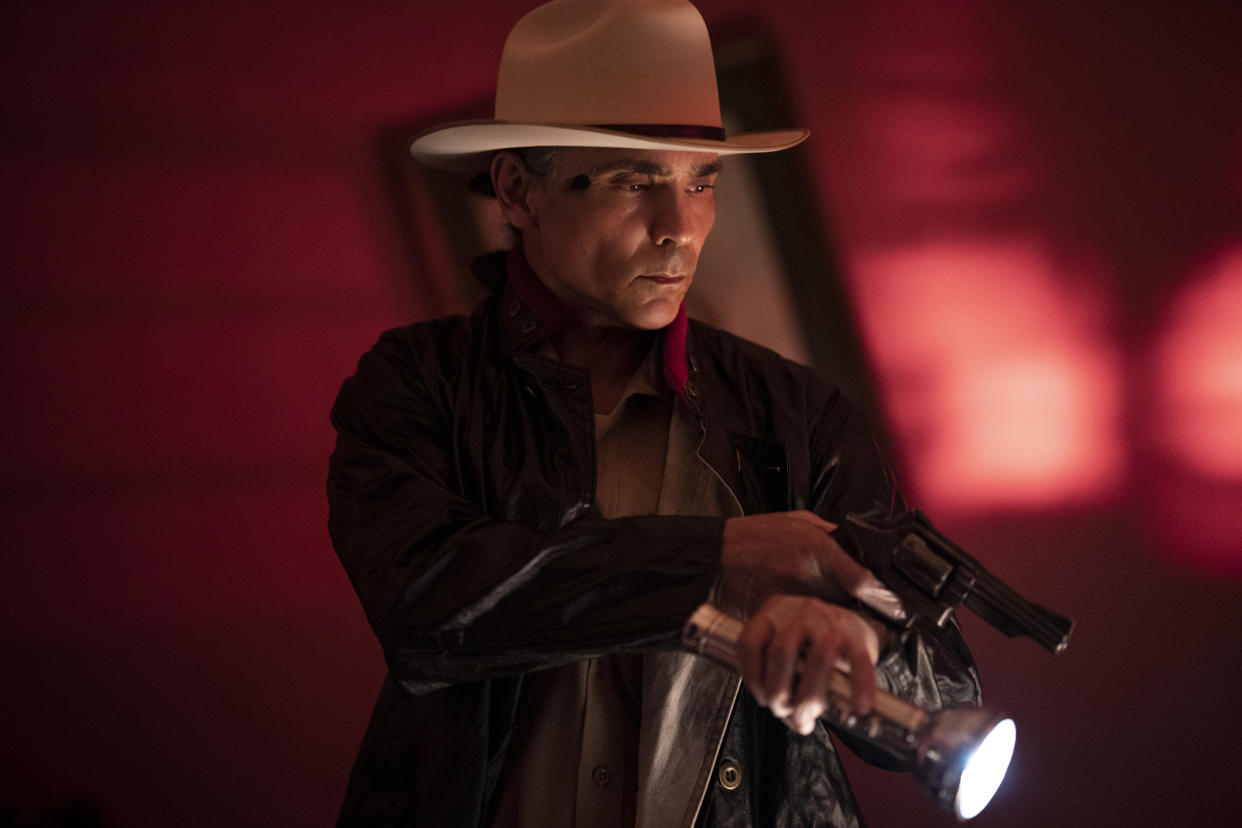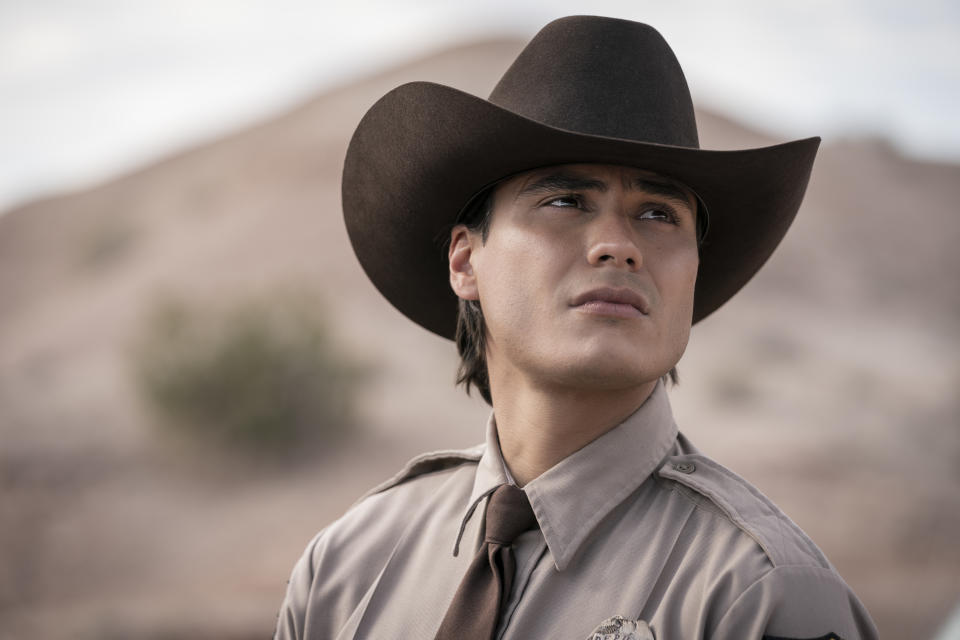‘Dark Winds’ Review: AMC’s Taut Murder Mystery Proves Power of Zahn McClarnon

There’s a moment in “Dark Winds” that sticks with the audience. A young Native woman visits a doctor. She is pregnant and the doctor urges her to have her baby in a proper hospital and not at home. His nurse is meant to act as translator. She tells the girl that while the doctor wants her to go to the hospital, it’s only so they can forcibly sterilize her after she gives birth. Though comparisons to “True Detective” and “Mare of Easttown” will crop up when discussing this series, it seeks to tell a deeper story within the murder format — one focused on the casual mistreatment of those living on Navajo land as well as Native peoples in general.
Set in 1971 on a remote outpost of the Navajo Nation near Monument Valley, we meet Sheriff Joe Leaphorn (Zahn McClarnon). Leaphorn is a good sheriff, but his personal life is a mess after losing his son. He’s given a new Deputy Sheriff, Jim Chee (Kiowa Gordon), who claims to be working with Leaphorn but has his own reasons for being there. The two are quickly pulled into investigating a double murder that the FBI is only interested in solving because a high-profile bank robbery has taken place nearby and the thieves are rumored to be on the Najavo nation.
More from IndieWire
Fun Netflix Docuseries 'Eat the Rich: The GameStop Saga' Will Make You Learn Something
'11 Minutes' Is an Agonizing, Aimless Recap of the 2017 Las Vegas Shooting
The series starts with a bang involving a daring daylight robbery that includes faux police and a helicopter. It doesn’t take long for the audience to understand this is a crime that took serious manpower to pull off, and yet after this introduction the robbery become a small blip for the leads of “Dark Winds.” In this case, Leaphorn is trying to solve who murdered an elderly man and a teenage girl, the latter having a personal connection to him. And yet, FBI agent Whitover (Noah Emmerich), whom Leaphorn dubs “High Pockets,” couldn’t care less. The FBI is concerned about it because, as Leaphorn says, it’s “white problems.” And while things eventually turn back around to connect the bank robbery to the murder it’s a blistering set-up for how crime is categorized differently when it involves Indigenous populations.
There’s very little fat to the show’s six episodes, which all clock around 45 minutes, leading to a breathless pace as Leaphorn and Chee try to solve the crime. And yet, within that crime is a beautiful story of identity, family, and life that audiences haven’t seen. Chee’s introduction sets the tone, as he speeds through town in his black Ford Ranchero, refusing to help a family stranded on the side of the road.

? 2021 Stalwart Productions
For him, the Najavo land is a town he’s left behind, due to rumors about his family. He’s assimilated and assimilation is a big issue throughout the series, with Leaphorn being resistant to it because of his own upbringing and Chee welcoming it. It’s why Emmerich’s Whitover is such a skeezy villain, because he lords his whiteness (and privilege) over Chee and Leaphorn. A conversation between Chee and Whitover at a hotel speaks volumes as Whitover talks about how Old Hollywood Western stars once stayed there only for Chee to ask, “Where did the Indians sleep?” Gordon’s cockiness underlies a character who has felt let down and abandoned by his people. The actor’s chemistry with Jessica Matten, who plays fellow officer Bernadette Manuelito, is charming in that both characters want to be known for who they are, and that includes both their Native and non-Native identities.
It’s interesting that “Dark Winds” often feels like an old-school film noir, with Leaphorn as the beleaguered, troubled detective not unlike someone out of a Raymond Chandler novel. McClarnon is always a welcome presence to see on-screen and he is utterly magnetic as Joe Leaphorn. Whether he’s investigating a crime scene, trying to work with Chee as his partner, or sitting in silence opposite his wife, Emma (Deanna Allison), McClarnon’s face is a storm of different emotions. Leaphorn, as a character, wears decades of trauma, love, and loss, and McClarnon captures it all. McClarnon has been working in Hollywood since the early ’90s — his appearance in anything is a sign of quality — so, if anything, “Dark Winds” should prove he’s a serious leading man. He’s complemented by Allison who, like nearly every character in the series, has her own fascinating backstory involving the aforementioned pregnant young woman.
Each character feels like a real person who has lived a rich life before entering Navajo lands, and with the taut screenwriting the series explores everything from forced sterilization to mining interests using their land lands for oil. Though set in the past it’s clear that none of these issues have ever been reckoned with. Each character holds them tight and we’re still seeing these same feelings of anger and questions of identity permeate Indigenous characters on other networks. They haven’t forgotten, and neither will the audience. Even those perpetuating the crimes have a logic and deep-seated history on why they’re doing what they’re doing and, at times, it becomes a more engaging plotline than the murders themselves.
“Dark Winds” may seem similar to other detective shows but it’s more than that. With well-written and sharply defined characters, plus an invigorating and tightly wound story, it’ll be hard to wait a week for each episode to drop.
Grade: A
“Dark Winds” premiered at the 2022 ATX TV Festival in Austin, TX. The series debuts Sunday, June 12 on AMC and AMC+.
Best of IndieWire
From 'Reality Bites' to 'Fatal Attraction,' Keep Track of All the Upcoming Film-to-TV Adaptations
7 New Netflix Shows in September 2022 — and the Best Reasons to Watch
Sign up for Indiewire's Newsletter. For the latest news, follow us on Facebook, Twitter, and Instagram.
